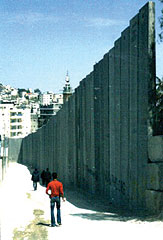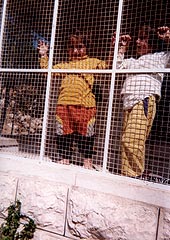
| HOME |
| NERVE |
| REVIEWS |
| ARCHIVE |
| EVENTS |
| LINKS |
| ABOUT US |
| CONTRIBUTORS |
| BACK ISSUES |
| CONTACT US |
 A
Liverpool Nurse spent four weeks in East Jerusalem and all over the West
Bank with the International Solidarity Movement (ISM) a Palestinian organisation
helping internationals support non-violent direct action against the Israeli
occupation and the building of the apartheid wall.
A
Liverpool Nurse spent four weeks in East Jerusalem and all over the West
Bank with the International Solidarity Movement (ISM) a Palestinian organisation
helping internationals support non-violent direct action against the Israeli
occupation and the building of the apartheid wall.
'Holiday' in Palestine
It was strange to be welcomed in this beautiful Middle Eastern country, a country that has not known independence for hundreds of years, an ex-British colony and occupied since 1948 by an Israeli government so heavily supported by the US and UK, that is so close to the horror of Iraq.
Most of the time was like a holiday. Palestinians learn English at school and are pleased to practice it as much as possible. They are so hospitable and humorous, their communities are very strong, totally sharing and caring. No drugs or alcohol problems, or isolation in old age (the main problems I encounter as a staff nurse in Liverpool).
Internationals are very safe on the West Bank. But whilst I was there 135 Palestinians, mostly women and children, were killed in Gaza by Israeli soldiers. All movement is restricted by 282 military checkpoints on the West Bank. The occupation is economically and socially suffocating for the Palestinians, with land continually confiscated, the good roads to be used only for settlers, the rough tracks for Palestinians even their ambulances. There are also curfews preventing the Palestinians from tending vegetable plots and olive groves. Within these conditions they still provide food and water for their people whilst fertile land down the road is closed to them, unused. Yet the settlers still use 80% of the water on the West Bank.
I don't think I could have faced the things I saw if I had not been with the only NGO trying to uphold international human rights laws. All other NGOs and the United Nations merely observe and only document the human rights violations of the occupation.
 I
attended five non-violent demonstrations against the Wall, organised by
local people. They'd invited the ISM, Israelis Against the Wall, and many
press agencies including Reuters. All came to the tiniest of villages
and all - no matter how peaceful - were met with Israeli soldiers raining
tear gas and sound bombs. On a couple of the demos Palestinians and Israelis
were arrested and beaten. On one totally peaceful demonstration, Palestinians
were shot with live ammunition, Israelis and one international (filming)
were shot with rubber bullets and the Medical Centre was later thoroughly
tear gassed. Each time though, the construction bulldozers were halted,
however briefly, from tearing into the beautiful, fertile countryside.
I
attended five non-violent demonstrations against the Wall, organised by
local people. They'd invited the ISM, Israelis Against the Wall, and many
press agencies including Reuters. All came to the tiniest of villages
and all - no matter how peaceful - were met with Israeli soldiers raining
tear gas and sound bombs. On a couple of the demos Palestinians and Israelis
were arrested and beaten. On one totally peaceful demonstration, Palestinians
were shot with live ammunition, Israelis and one international (filming)
were shot with rubber bullets and the Medical Centre was later thoroughly
tear gassed. Each time though, the construction bulldozers were halted,
however briefly, from tearing into the beautiful, fertile countryside.
After the first demo we stayed in the village when all the other outsiders had left. We were in a shop when soldiers patrolled. They took the shopkeeper out at gunpoint for serving us. They eventually let him go, but we were very shocked and hid from all locals the rest of the afternoon; that night I could not sleep.
I went to Hebron four times, Jerusalem's Old City. It is full of traders, even if tourists are thin on the ground. Hebron is old and more beautiful than anywhere I'd seen, but under heavier occupation. The Old City and its 600-year-old market is a ghost town. Soldiers' checkpoints are on every corner, plus roadblocks, and the only people wandering freely are settlers. Palestinians have abandoned the city centre due to all the military checkpoints and settlers' violent attacks. They used to walk to the central market, but now have to travel all around the edges of the city in minibus taxis to shop. The Industrial Zone was under 400 days of curfew - workers risked their arms being broken by soldiers if they went to work; the university was closed for at least six months.
When I visited, Palestinians lived in fear; they could not even visit friends close by. Many continued to be terrorised out of their homes, demolished to make way for settler expansion. I spent 48 hours with a group of families, overlooked by a settlement. They lived in fear of settler violence and losing all they have. The demolished houses of neighbours who had left were visible. They could not cultivate the edge of their land or venture out the back except in a large group, for fear of settler attacks. (I saw a settler on their land on the Sabbath.) Visitors were restricted by the soldiers; after 7pm they stayed indoors with the metal shutters on the windows, for fear of settler attacks. They told me 15 years ago, 15-20 tourist buses came to Hebron every day, but that has stopped completely and the economy is dead. The younger children used to be so much fun and played freely in certain areas of the garden, but today older children are more reflective, becoming aware of the bleak reality.
 After
that it was actually a relief and a joy to pick olives by the completed
Wall near Tulkarem, with a family who had been made homeless three times
since 1948, and said they would not pick olives in that grove again.
After
that it was actually a relief and a joy to pick olives by the completed
Wall near Tulkarem, with a family who had been made homeless three times
since 1948, and said they would not pick olives in that grove again.
At this point the Wall is a brand new road with deep ditches, a high fence
with razor wire, and another with CCTV cameras every few yards, and an
occasional unmanned surveillance aircraft overhead. It is the most beautiful
idyllic countryside with ruins, thousands of years old, somewhere in the
distance, and a lush orange grove in between. A Palestinian was arrested
for trying to tend his oranges the week before.
The open spaces in Israel are huge as are the spaces around Israeli settlements on the West Bank. Palestinians are crammed into 20% of 1948 Palestine and will have 11% if the Wall is completed. There are 154,000 rural Jews occupying 17,325 square kilometres, which are the home and heritage of 5 million Palestinian refugees. Equal land and employment rights for Palestinians and Israelis would solve all these problems. The vast majority of Israelis (like Brits) want peace. Palestinians would give anything to be free. But the US and UK fund the Israeli state, making it the 5th largest military state in the world.
To go to Palestine with the ISM, or to find out further information visit: www.palsolidarity.org
Printer friendly page